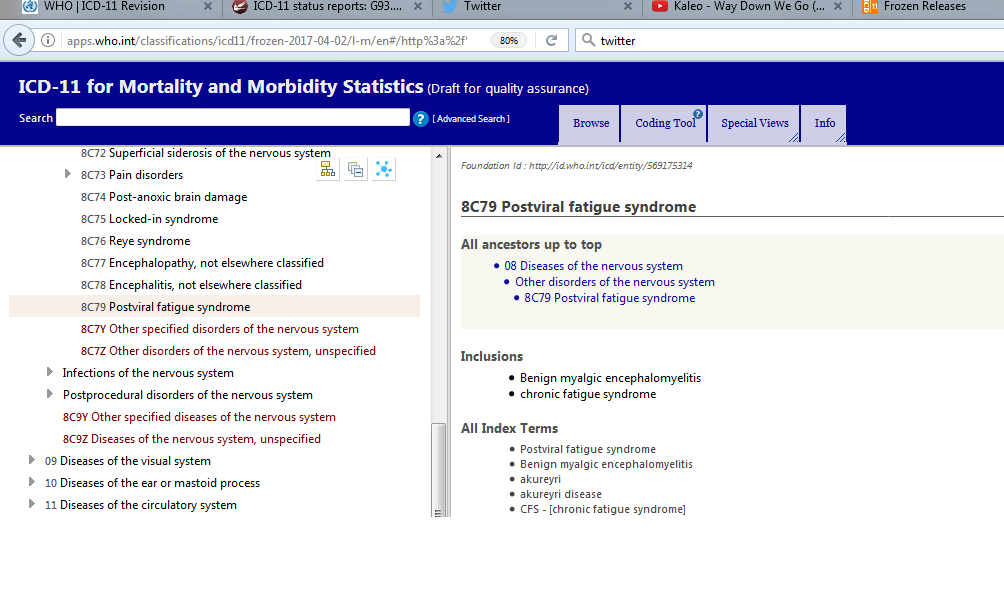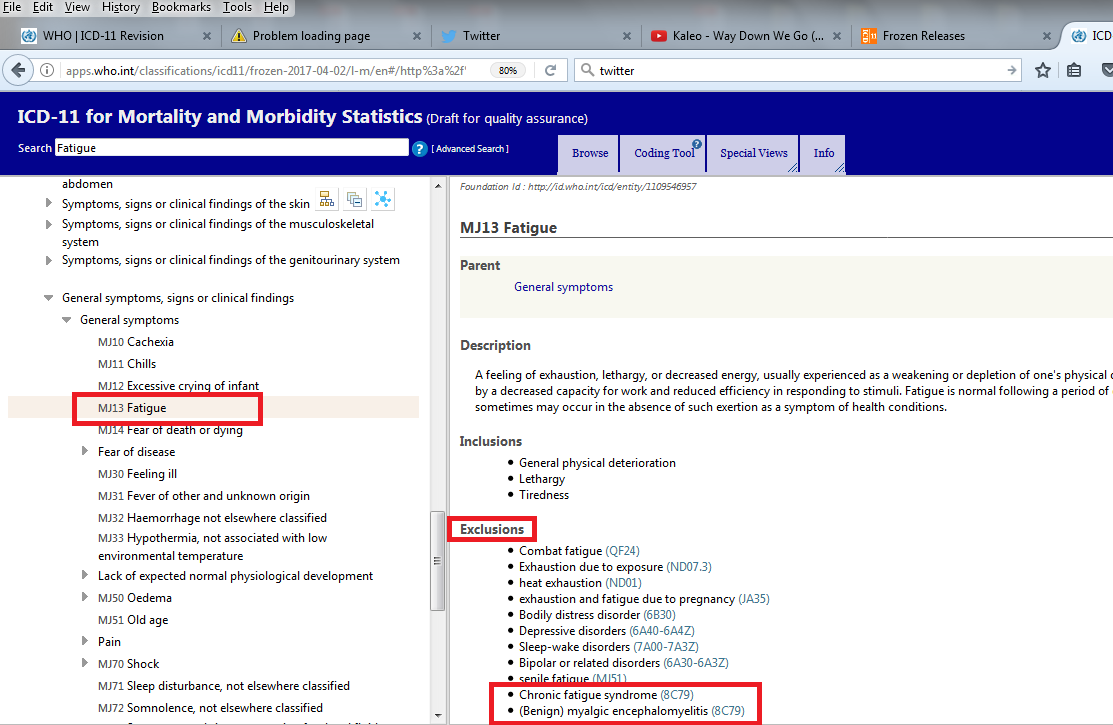The PDF at the end of this post contains a partial transcript of Prof Peter White's presentation at the Royal Society of Medicine CFS Conference, London, April 28, 2008.
This partial transcript is an unofficial transcript prepared by me, in 2009, for use in a legal case. It transcribes the first 6:55 minutes and the closing minutes of Prof White's presentation. It also includes a URL to a video of the full presentation on YouTube.
It is of topical interest, as Prof White is discussing his views on the utility of what he calls the ICD-10 "criteria" for ME and CFS. Note that in ICD-10, there are no criteria for ME and CFS - the classification only lists terms.
After running through a list of possible terms that he claims one might pick from in ICD-10, he concludes:
"So ICD-10 is not helpful and I would not suggest, as clinicians, you use ICD-10 criteria. They really need sorting out; and they will be in due course, God willing."
Note that Prof White lists the following terms in the context of ICD-10:
"Chronic fatigue syndrome (postviral)"
This term is
not included in the WHO's ICD-10.
It was a term that
had been included in the 2003 consultation release of the draft for the U.S. specific, ICD-10-CM. (The final ICD-10-CM was not implemented until October 2015.)
That term had appeared in the
2003 release of the draft ICD-10-CM as:
G93.3 Postviral fatigue syndrome
Benign myalgic encephalomyelitis
Chronic fatigue syndrome, postviral
Excludes1:chronic fatigue syndrome NOS (R53.82)
and under the R codes, as:
R53.82 Chronic fatigue, unspecified
Chronic fatigue syndrome NOS
Excludes1: postviral chronic fatigue (G93.3)
postviral fatigue syndrome (G93.3)
A copy of this 2003 release of the draft of the U.S. specific, ICD-10-CM Tabular List, can be downloaded from my site, here. (It's a large file and may take a while to download):
https://dxrevisionwatch.files.wordpress.com/2015/03/icd-10-cm-draft-2003.pdf
No further draft was released until 2007. In 2007, the inclusion term
"Chronic fatigue syndrome, postviral" had been removed by NCHS/CDC, from under the G93.3 code.
The
"Excludes1: postviral chronic fatigue (G93.3)" had also been removed from under the R53.82 listing, leaving only the one inclusion term under the G93.3 code:
G93.3 Postviral fatigue syndrome
Benign myalgic encephalomyelitis
Excludes1: chronic fatigue syndrome NOS (R53.82)
and only the one Excludes1 under the R53.82 code:
R53.82 Chronic fatigue, unspecified
Chronic fatigue syndrome NOS
Excludes1: postviral fatigue syndrome (G93.3)
So, although Peter White asserted in 2008 that one might consider (among a number of other terms) using the ICD-10 term,"Chronic fatigue syndrome (postviral)", that term does not exist in WHO's ICD-10,
nor did it exist in the U.S. specific draft of ICD-10-CM by the time the 2007 release was published.
So that was a red herring.
A copy of the 2007 release of the draft ICD-10-CM Tabular List can be downloaded from my site, here:
https://dxrevisionwatch.files.wordpress.com/2015/03/2007-tabular-list-release.pdf
Prof White also states in his RSM presentation that the following two ICD-10 terms might be considered for use for ME and CFS:
"Chronic fatigue, unspecified"
"Chronic fatigue syndrome NOS"
Neither of these terms appear in the ICD-10 Tabular List, in 2008 (and they do not come up as Index terms using the browser for ICD-10 Version: 2008). Again, the two terms are exclusive to the U.S. specific, ICD-10-CM, which was still in draft, in 2008.
(There is no "chronic fatigue" anyway in ICD-10; only a "Fatigue syndrome", listed as an inclusion under F48.0 Neurasthenia.)
He then lists the following ICD-10 historical terms:
"Effort syndrome"
I can find no "Effort syndrome" as an tabular list entity in WHO's ICD-10 Tabular List for 2008 nor identified as an entity in the Index, but a search for "Effort syndrome" pulls up Neurasthenia.
"Effort syndrome" is a term I was amused to see Prof Sir David Goldberg's PCCG work group still using,
in 2013, on Page 12 of the Master Protocol for the field trials for the Primary Care version of ICD-11 for field testing Goldberg's proposed "Bodily Stress Syndrome (BSS)" diagnosis - which was an adaptation of Fink et al (2010) Bodily distress syndrome:
Depression, Anxiety and Somatic Symptoms in Global Primary Care Settings: A Field Study for the ICD-11-PHC RPC 565 Version 2, 8/4/2013
in which it states:
"Patients with conditions such as fibromyalgia, irritable bowel syndrome and effort syndrome ARE eligible for this part of the study, as are patients without any such label for their symptoms."
"Da Costa syndrome"
and
"Neurocirculatory asthenia"
In the 2008 release for ICD-10 Tabular List, "Da Costa's syndrome" and "Neurocirculatory asthenia" are listed as inclusion terms under
F45.3 Somatoform autonomic dysfunction
So I'll allow him those two terms - though I very much doubt that any of these three terms were being used to any great extent in clinical settings, in 2008, and hardly worth mentioning.
So, rather a lot of scraping of the bottom of barrels in order to pad out his list of "multiple terms" for CFS and ME in ICD-10.
Here is my partial transcript:
https://dxrevisionwatch.files.wordpress.com/2017/04/peter-white-rsm-20082.pdf
http://bit.ly/2oc24s0
and here is the YouTube of the full presentation:



